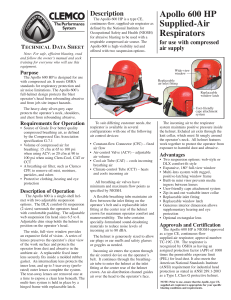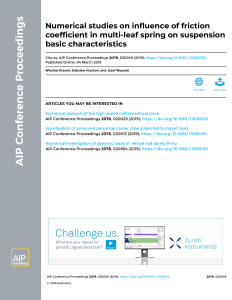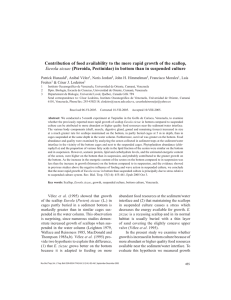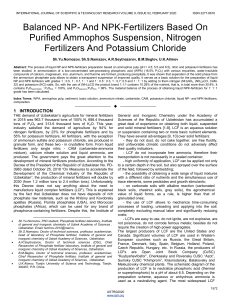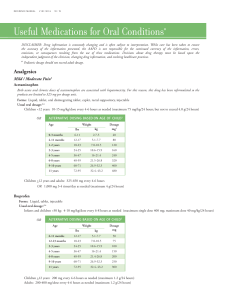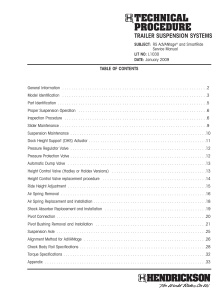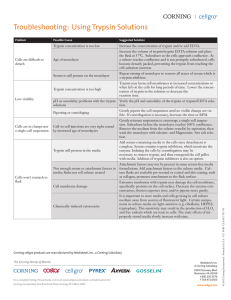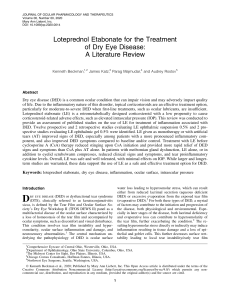WHEN FACING A SUSPENSION
Anuncio
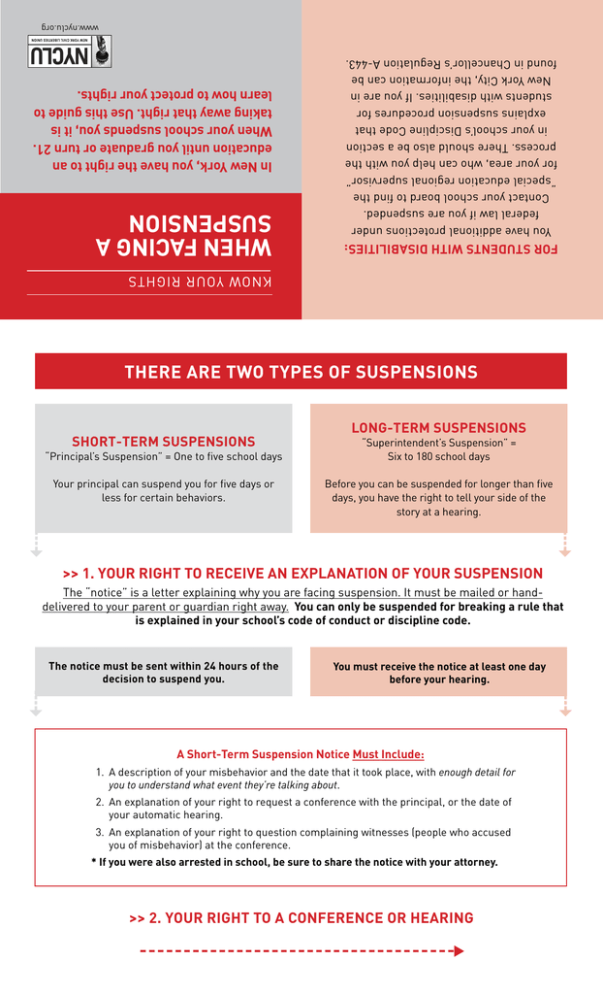
www.nyclu.org You have additional protections under federal law if you are suspended. Contact your school board to find the “special education regional supervisor” for your area, who can help you with the process. There should also be a section in your school’s Discipline Code that explains suspension procedures for students with disabilities. If you are in New York City, the information can be found in Chancellor’s Regulation A-443. FOR STUDENTS WITH DISABILITIES: In New York, you have the right to an education until you graduate or turn 21. When your school suspends you, it is taking away that right. Use this guide to learn how to protect your rights. WHEN FACING A SUSPENSION KNOW YOUR RIGHTS THERE ARE TWO TYPES OF SUSPENSIONS SHORT-TERM SUSPENSIONS “Principal’s Suspension” = One to five school days Your principal can suspend you for five days or less for certain behaviors. 6 LONG-TERM SUSPENSIONS “Superintendent’s Suspension” = Six to 180 school days Before you can be suspended for longer than five days, you have the right to tell your side of the story at a hearing. >> 1. YOUR RIGHT TO RECEIVE AN EXPLANATION OF YOUR SUSPENSION 6 The “notice” is a letter explaining why you are facing suspension. It must be mailed or handdelivered to your parent or guardian right away. You can only be suspended for breaking a rule that is explained in your school’s code of conduct or discipline code. 6 The notice must be sent within 24 hours of the decision to suspend you. You must receive the notice at least one day before your hearing. A Short-Term Suspension Notice Must Include: 1. A description of your misbehavior and the date that it took place, with enough detail for you to understand what event they’re talking about. 2. An explanation of your right to request a conference with the principal, or the date of your automatic hearing. 3. An explanation of your right to question complaining witnesses (people who accused you of misbehavior) at the conference. * If you were also arrested in school, be sure to share the notice with your attorney. >> 2. YOUR RIGHT TO A CONFERENCE OR HEARING u ------------------------------------- 6 Your suspension hearing or conference is your only opportunity to tell your side of the story and you MUST attend if you want the chance to change the school’s decision. You Have the Right to Request a Conference with Your Principal You must ask for this conference—it is not automatic. You Have the Right to a Hearing This is an automatic hearing and will occur even if you don’t go. You Have the Right to… You Have the Right to… • Ask for your suspension to be canceled or shortened. • Ask for your suspension to be canceled or shortened. • Bring a parent or guardian to the conference. You may also be permitted to bring a lawyer or other representative with your principal’s permission. • Question school staff who accused you of misbehavior. You can question student witnesses with your principal’s permission. • Request another date for your hearing if you can’t make the proposed date. • Bring an attorney or trusted adult to your hearing. • Question people who claim they saw what happened. • Bring people to support your side of the story. 6 • Remain silent—you don’t have to answer any questions. You can ask a witness tell your side for you. 6 After the Hearing… After the Conference… The principal will issue a written decision about the suspension. The principal may dismiss the suspension or suspend you for one to five school days. The hearing officer will decide if the school has proven the charges against you. You must receive a written decision that the charges were either thrown out or found to be true (and if so, how long the suspension will last). 4 4 >> 3. YOUR RIGHT TO APPEAL YOUR SUSPENSION If you lose at your suspension hearing or conference, you have the right to appeal your suspension. Appealing means asking a higher level authority (usually your school board) to reconsider your case. Reasons to Appeal: 1. Overturn a wrongful suspension. 2. Shorten the amount of time you spend out of school. 3. Get the suspension off your academic record. WHEN CAN YOU APPEAL A SUSPENSION? Anyone can appeal a suspension. Many suspensions are overturned on appeal because the school didn’t follow the rules when suspending a student. Common Grounds for Appeal: • You did not receive notice about your suspension at home. • The notice you received did not contain enough information. FOR MORE INFO: • You were never given a chance to tell your side of the story at a hearing or conference. • You were suspended for a rule that is not in your school’s code of conduct or discipline code. 125 Broad Street, 19th Floor New York, NY 10004 Tel 212.607.3300 Fax 212.607.3318 www.nyclu.org • You were denied your rights during the suspension hearing (for example, if you were forced to answer questions or were not permitted to bring a representative).



